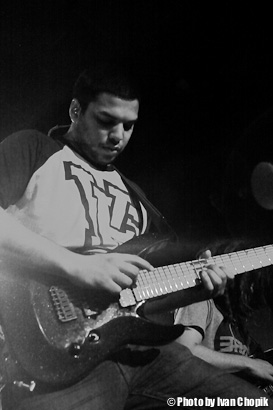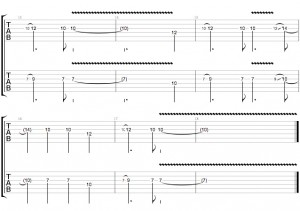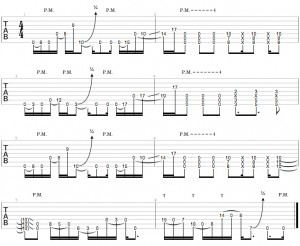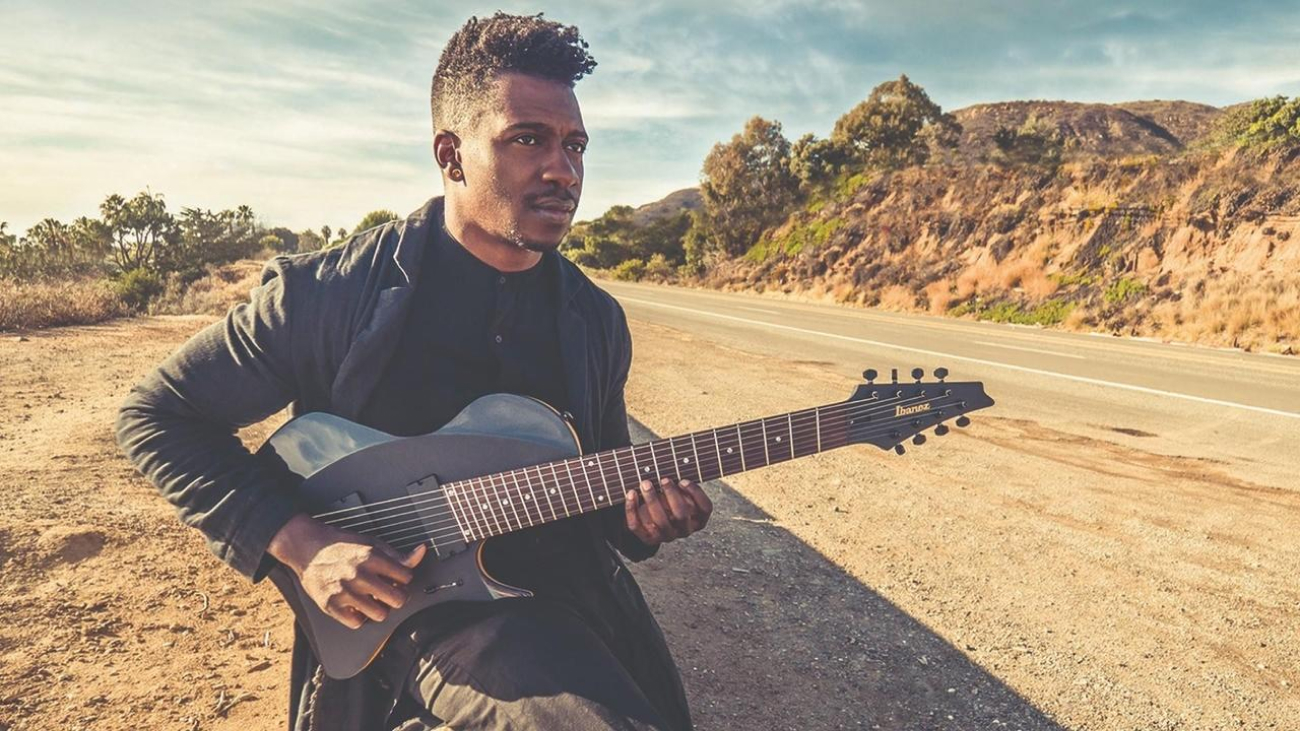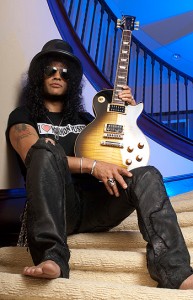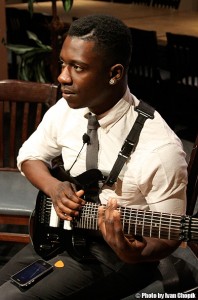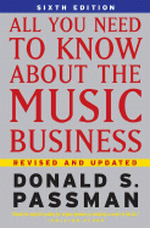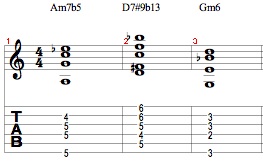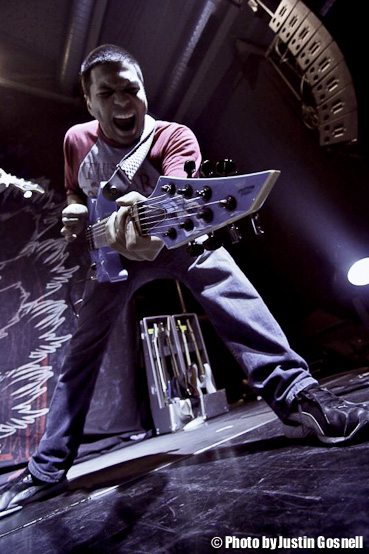 Since their influential debut album release in 2010, Periphery have morphed from a fledgling young group with an eclectic blend of styles into a modern progressive metal powerhouse. After undergoing a number of lineup shifts and touring the world several times over, including a direct support run with the mighty Dream Theater, the sextet from Bethesda, Maryland arrived at their second release, Periphery II: This Time It’s Personal.
Since their influential debut album release in 2010, Periphery have morphed from a fledgling young group with an eclectic blend of styles into a modern progressive metal powerhouse. After undergoing a number of lineup shifts and touring the world several times over, including a direct support run with the mighty Dream Theater, the sextet from Bethesda, Maryland arrived at their second release, Periphery II: This Time It’s Personal.
This album declared a new chapter for Periphery, revealing a familiar, yet more refined sound that continues to push the boundaries of the styles it engulfs. I had the opportunity to sit down and catch up with the band’s founder and mastermind, Misha Mansoor at the Fort Lauderdale, Florida stop of the 2012 Summer Slaughter tour:
IC: At the time of our first interview in April 2010, Periphery [debut album] had just dropped. A lot has happened for you in the years since then. In broad terms, how has your life changed, both personally and professionally?
MM: That album made Periphery a real band and gave us our career so far. It’s pretty much responsible for where we are right now, which is really cool. It had this slow and steady kind of growth over the last few years.
You know, we lost a few members. We lost Tom [Murphy, Bass] and Alex [Bois, Guitar], but we gained Mark Holcomb [Guitar] and Nolly [Adam Getgood, Bass] and we also have Jeff [Holcomb] filling in on bass right now and filming the documentary, so he’s also getting footage of all this, which is great.
So we met a lot of cool people and I think our band is stronger as a result. We were able to collaborate a lot more when it came to writing the second album. It’s just been a steady progress as a business, so I’m glad for that. I’m stoked.
IC: How’s your day-to-day life changed from the SoundClick days?
MM: Well, now for one I can’t post music up quite as freely as I did before. For a while I really wanted to, but the truth is that, the SoundClick was always just kind of, whatever I was writing at that point in time… I’d put it out there and that’s what it would be and maybe I would update it when I’d have a better version of the song.
Nowadays, if I do that, then everyone is just going to be like, ‘oh, we’ve already heard this before,’ so now whenever I write something, as much as I would love to share it with everyone, we have to keep it to ourselves. That was actually kind of hard at first, because I really like just being able to give everything out, you know? I think, because of this, everyone will hear a lot more new material on the actual album. I could have posted the demos for all the songs that weren’t on the SoundClick for this second album and I feel like the response would have all been a little different. They’d all heard demos beforehand so, I’d say it’s definitely changed in that way.
We’re in a bandwagon now, which is kind of cool. We don’t necessarily do this for every tour, but it’s cool to be able to do this for certain tours rather than the van, which you know we were in for a few years… and we’ve done these summer tours in a van which is very, very difficult. It’s very taxing.
IC: I remember you guys had your bunk setup in the van. Four people in the back, two in the front. [Check out some footage of this setup from our friends at DigitalTourBus.com HERE]
MM: Yeah, that’s something that Jake [Bowen, Guitar] built… well, Jake and Justin [Gosnell], actually. It started off as a flat bed and then we upgraded it to bunks, eventually. That was cool, but it was also just terrifying. It’s nice to not to be completely scared for your life every night [laughs].
IC: Well, you’ve paid your dues so far and now you’ve got this [bandwagon], so that’s awesome.
MM: We definitely appreciate this, because we can compare it to how different it was from the vans.
IC: Periphery II: This Time It’s Personal broke the Billboard Top 50 – congratulations! How did that measure up against your expectations? Were you surprised? Were you hoping for more? Did you expect less? What was your thinking going into this?
| Click play above to watch the video of this interview. |
MM: A lot of you guys watching may not be very aware of what record sales mean anymore. And to be fair, it changes every year, because people don’t really buy records and these numbers may not sound like a lot. I remember when our first record came out, we [sold] 4,500 copies first week and a lot of people were giving us props and a lot of people were very impressed that we did that for our debut.
I didn’t understand why, because it was such an arbitrary number to me and I didn’t have the context on how our peers did, but that was a very good number for our debut album, for it being our first one. I think everyone on our team was expecting more like 1,000 or 2,000 sales on first weekend.
As I’ve explained online, first week sales are a very important thing for a band, because it’s how the industry places you and judges where you stand; things like guarantees (how much you get paid every night), what kind of tours you get offered, and where you’ll place on the tour (where you’ll actually be playing [in the lineup]) are determined and in a lot of cases negotiated with the first week sales…
At the end of the day, it actually determines how much money you’re going to make because of your guarantees. If you do more first week [sales], you are going to get higher guarantees. It’s just basically an antiquated way of judging a band, but it’s the only way they look at it, or one of the few ways they really look at it. That does really affect where you’re going to stand on your album cycle and I think us having good first week sales on our first album did a lot of good for us. I mean, I know it did.
It landed us all sorts of endorsements, helped us with our guarantees and to get good tours. I was expecting this time around to get maybe 8,000. I was like ‘if we do 8,000, I’ll be so stoked,’ because that was about double what we did last time and I’d have been really happy. Our management was like ‘we think 8 to 10 would be cool’ and I was like ‘10? That’s not going to happen.’
When I heard we almost did 12,000, I actually texted our manager and I was like ‘check that number,’ because that can’t be right, you know? He triple checked for me and it was, so I was like ‘wow.’ It really took us aback and we really have to thank everybody for supporting, because that number is obviously just a reflection of what you guys did and how you supported us, so it really means a lot. Thank you very much.
IC: You recently announced you are going to be collaborating with Nolly on a production company [Top Secret Audio]. Can you tell us a little more about that idea and what each of you brings to the table in the company?
MM: Nolly has been a huge part of this band, even though it’s never been official, and he’s been one of my best friends. We’ve always worked on production and engineering together, but he’s always had kind of the [strength] in the engineering side of things, because he’s so meticulous with everything and he learns and wants to understand why everything is the way that is.

Periphery II: This Time It’s Personal (Album Cover)
I was more of the kind of guy who just jumped in and did everything by ear and figured things out that way. So my learning process was a lot longer than his, because it’s just sort of my style to just jump in and figure it out from there, while he kind of takes a step back and wants to understand why and how things are the way they are.
I feel like as a producer I can bring a lot to the table. I’m pretty happy with my mixes for the most part, but I never felt blown away or I’ve always felt like there’s another level that could be reached, and Nolly is the person that can help me do that. Nolly is very strong with the engineering side, but he feels like his weakness is the producing side of things, so it just made a lot of sense.
IC: You two complement each other.
MM: We complement each other very well. What we can do is just take a band that has even nothing at all and kind of write the album with them if need be, but at least do all the pre-production and then properly record them after the fact; just from inception to complete finished product we can completely handle a band. That was the idea behind this production team.
He was engineering and co-producing on [Periphery II: This Time It’s Personal] and that should give you a sense of the kind of stuff we can do, you know? If you will, I did the first album myself so the difference in sound and everything between the first and the second is going to be the difference in sound between my productions and the production team. That would be a good way to gauge what we’d be able to do.
IC: Taylor Larson [Oceanic Recording] was the official mix engineer on the album, but you and Nolly also contributed. What were your contributions like as far as the engineering and the mix?
MM: We went to Taylor for the drums and the vocals. We wanted to do live drums, and that’s the aspect that Nolly and I were kind of not as familiar with. We were also after very specific guitar and bass tones that Taylor really was out of his comfort zone with. The idea was that we’d handle the guitars and the bass.
Spencer [Sotelo, Vocals] has become quite the producer and he actually works with Taylor and at Taylor’s studio producing bands and their vocals. He’s a Pro Tools wizard and all that. He has all these creative ideas, so we knew that between Spencer and Taylor doing the vocals, that they would just get it done, so we didn’t even concern ourselves with that. This division of labor made it very easy to focus on just these aspects and getting them just right.
Taylor absolutely nailed the drum sound; we’re so happy with that. We mic’d up cabs; there were mics on everything this time. The first album was all ‘in the box;’ the only mic was for vocals. This time there’s mics on everything! That was kind of out of our comfort zone and we worked with that. At times it might have felt like there were too many cooks in the kitchen, but ultimately we put a lot of work into it and we got the mix exactly the way that we wanted it.
With this production team, because we don’t have a studio yet, we probably would have whoever we’re recording, record at Taylor Larsons,’ because he gets incredible drum sounds. That would be part of it; outsourcing the drums to there and probably have Spencer do vocals, too, because he does fantastic work.
IC: As far as the guitar tones, you’ve said many times you used your [Fractal Audio] Axe-Fx II, but this time you were running it through a EVH 5150 III, using the head as a power amp.
MM: I have one of those heads and I love it to death. We needed a power amp and its the only tube power amp I have, so we tried it out and it sounded fantastic. We ran that out to a Mesa [Boogie] oversized cab and put a bunch of mics on it… don’t remember exactly which ones, but a [Shure SM57], a [Shure] Beta 57…
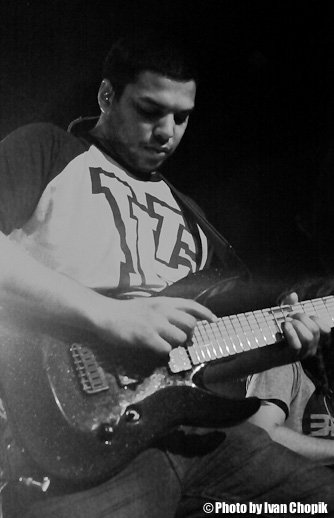
IC: I thought I saw a [Sennheiser MD] 421 in there…
MM: I don’t know if we used a 421.. we might have used a 421, actually… I forget. We wanted to create something unrepeatable, because technically with all the tone-matching now, you could kind of just get the first album tone… technically you could dial it in, EQ it in, and process it the same and you’d have exactly the same thing.
Here there are so many variables that I don’t think even we could recreate it, you know? It’s the room, the placements of the mics, placement of the cab in the room, what was in the room… so many factors. I’d say one of the most difficult things was actually creating a consistent guitar tone throughout the recording. So many times we kind of lost it and had to find it again and it came back a little differently.
I don’t think you’d notice in the context of the album too much but it was a real headache on our part, because we wanted this unrepeatable aspect, but it was kind of unrepeatable to ourselves even in the studio even with most of the variables being static. I don’t know necessarily that we will go that route in the future, because it’s not necessarily that it even sounded better; it was just something unique and it was a learning experience. We all learned a lot.
IC: I was wondering about how you came to think of going that route. Do you see yourself incorporating more tube amps in your live rig or other recordings?
MM: In the live rig – no. Recordings – maybe. For the studio, I feel like you should have all the options that you want and when we record we’ll just do DI’s and re-amp and see what sounds best. The Axe-Fx is a tool – it’s a means to an end, but it’s not something I’d use, just because I have to use it – I don’t. Even the guys at Fractal understand that.
For touring, it’s just the most practical thing ever. It sounds exactly the way I want our live guitar tone to be. The fact that you can just put it in a carry-on and take it overseas and that’s your whole rig… that’s kind of unbeatable. For those of you who don’t tour, you normally have to rent backline, which costs money and it’s a pain. You have to rent all the gear you use, so the very fact that you save money and it’s all in your bag, it’s right there… that goes a long way.
Until I have someone carrying and setting up my gear, I probably would never be considering using a tube rig or a more complex rig. Right now, we have very little gear. I think you made a comment that we have nothing on stage.
IC: Yeah, you have…. drums.
MM: Yeah we have drums, we have in-ears, and our [Apple] MacBook does all of our switching for us, so we can just play and stand anywhere we want. We have wireless Line6 packs as well, so we’re not committed to any area of the stage and there’s nothing on the stage, so that’s kind of cool.
IC: Over the years of listening to your songs, [I’ve noticed that] as a guitar player, you always come up with some new [playing approach], whether it’s a tapping technique, some kind of hammer-on thing you put into your riffs, or a new tuning. Is there anything in particular that you’re working right now on as a guitar player, that you’ve discovered recently?
MM: We’re always messing with tunings, which is something I always regret doing in the long run, because it just means we have to bring more guitars. There’s more tunings on this new album, too, so it can be a headache. The only thing I really experimented with was just doing a bit of slap guitar and that’s in ‘Make Total Destroy.’ That was on a whim, because we were just messing around with playing the slap bass under that part and we’re like ‘that sounds cool,’ and then we we’re like ‘what if we did that on the guitar?’ and that sounded really cool, too.
| Jeff Holcomb’s Summer Slaughter 2012 Documentary. |
I don’t know how much I would integrate that [into my playing], because I’m not particularly good at it, you know? My approach to writing is really just, once again: everything is a means to an end. It’s all about getting that idea out there, so I would never seek out techniques just to show the techniques off. It would have to serve the purpose of the song.
Any time I’m tapping or doing whatever, it’s because that tapping line sounded cool. It wasn’t because I was like ‘I really need a tapping lick or sweeping lick.’ Maybe hybrid picking would be cool [to get into], but I feel like that’s way over my head right now. If there’s one thing I’ve worked on a lot, it’s probably my vibrato. Definitely worked on getting my vibrato more 80’s… more wide, even… 1,2,3 – out kind of thing. And my alt picking, because I’ve always been really weak with my alt picking.
IC: I remember you mentioned that last time.
MM: It’s something that I’ve been wanting to work on. I got some killer tips from John Petrucci, so that went a long way.
IC: Can’t get better advice than that.
MM: Yeah. He’s a good teacher, too. So yeah, that’s what I’ve been working on.
IC: Speaking of John Petrucci and Dream Theater, you guys were planning to work on your next album, the concept album, at the time you got the offer for the Dream Theater tour, which you have to take…
MM: Yeah. You have to take it… [laughs].
IC: That being said, the work on that album got pushed back, so what’s the status on that and how far did you guys get into it?
MM: I think it got pushed back even further now, because as we have been discussing what we can do with it, and the scope of the project has gotten a lot bigger as we’ve been fleshing it out. The whole motivation of this project, at least now, is that we’re going to write backwards to what we’re used to, so we’re going to be out of our comfort zone and be on our toes. Normally, what we would do is, we’d just write a song… like one of us would write a song, or we’d write a song together. The vocals come later and the lyrics come later.
This time around, the story will come first and that’s what we’ll be sort of scoring to. I want the music to be very appropriate to what’s going on and thematic, and that’s going to force us to flip it around and look at it based off the story and the lyrics as the first thing we approach, rather than the last thing.
I just think it can be a lot of fun. Because the story has gotten kind of fleshed out and is a little bit more in-depth and we realized we can get more in-depth with it. The scope of the project is a lot bigger and I don’t know when it’ll be done. I will say it is the next thing we are working on and the next album we put out will be the concept album.
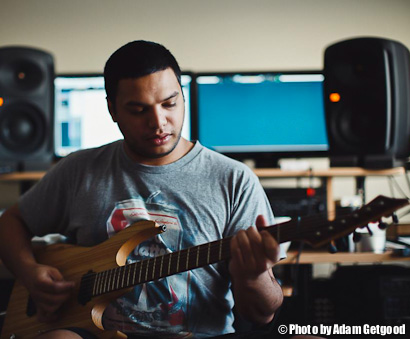 IC: One of my favorite early Periphery tracks is ‘Inertia‘ and I know that was meant to be a part of the bigger picture of songs. Is it going to be part of this album?
IC: One of my favorite early Periphery tracks is ‘Inertia‘ and I know that was meant to be a part of the bigger picture of songs. Is it going to be part of this album?
MM: That’s definitely planned for it. Once again, we have to make everything fit and that does fit in with the theme, lyrically. I want to say ‘yes,’ but then I don’t want it to not work out and be like ‘you said yes.’ I’d say there’s a good chance it will be on there.
IC: What are the plans for the remainder of the year? You have the Summer Slaughter tour right now. What’s going on after that?
MM: Believe it or not, I feel like we’re halfway through this tour, but we’ve got like a month left… it’s a long one. After that, we get a month off at home, then we’re heading out on the road to a UK / Europe tour with Between The Buried And Me and The Safety Fire.
That’s going to be good times, because we’ve become good friends with the guys from Between The Buried And Me on this tour and we’ve toured with the guys from The Safety Fire a bunch of times… good buddies. This is going to be a great time one way or another, and then after that we don’t really have anything planned as of yet. There’s some stuff being discussed other than this cruise… this Mayhem cruise. I don’t know if you know about that?
IC: Taking off from Miami, right?
MM: Right, so we might catch you then. Unless you’re going to be on the cruise, right?
IC: You’ll probably catch me if I’m on the cruise then…
MM: I’ll definitely catch you if you’re on the cruise… You’ll probably be too drunk to film.
IC: Everything is going to be out of focus slightly, right?
MM: It should be an accurate representation of what the cruise looks like for everybody else.
IC: Everything is B-roll [laughs].
MM: Exactly [laughs]. That’s got Gojira on it. I don’t know, actually, if Lamb of God is still playing that anymore, because of that whole horrible unfortunate situation [Singer Randy Blythe’s arrest in the Czech Republic]. A bunch of other bands, I think Born of Osiris is going to be there, which always means it’s going to be a party. That’s the only thing we’ve got… kind of a vacation on a boat, that I guess could be called work by some stretch of the imagination, but really, really won’t be…
IC: Playing a couple shows and doing some partying.
MM: On a cruise…. We’re going to be working hard! [laughs]
IC: Last time I asked you for some advice for young upcoming bands and the main point you made was about patience – about taking the time to do things right. A couple of years have passed… is there another piece of advice that, over these years you’ve come to realize and you’d like to share?
MM: That’s definitely one aspect… the patience thing is true as ever, if not more true. I don’t know if I went into this the last time, but it’s a business and you should treat it like it’s a business. You really should. We’re a small business… that’s what we are by definition. We take our numbers very seriously and we have sales goals we’re trying to hit and gross earnings we are trying to hit. We pay our taxes and we have an accountant and a business manager. These are very important things… it’s important to manage your money.
I see a lot of bands that don’t do that. Money has this way of slipping through your fingers when you commit it to memory, and with the amount of information that comes in with a band especially as you get bigger and bigger…. it’s a lot to manage. Either manage it very carefully yourself or have a business manager because, often times, even though you are paying a business manager a percentage, if you have mismanaged money, you actually lose more by having it mismanaged, than what you’d pay a business manager to have it well-managed, and to have your stuff under control and be able to look and see numbers on how you’re doing, financially.

Misha Mansoor & Marc Okubo at their 2010 Guitar Messenger interview.
This is a small business first and foremost, and if you don’t treat it with that kind of respect, you won’t be capitalizing on it at all and it could be the thing that destroys you. Just be very responsible with your money, because there is very little of it going around in this industry, especially in this scene. The little that you get needs to go a long way and if you manage it carefully, it can go a lot longer and do a lot more for you.
IC: In our 2010 interview with you and Marc Okubo [Veil of Maya, Guitarist], you guys were talking about the idea of getting to a point where you could completely focus on [your music] and not be dependent on other jobs. Have you gotten to that point now?
MM: Not yet, no. Believe it or not, we haven’t yet. We’re still at it. You know, some people might look and be like ‘oh you know, you are on this bandwagon right now and it’s expensive… it’s something you pay for. Why not do it in a van?’ If we did it in a van, we’d make a lot more money, but one of the things a lot of people take for granted, is that the less responsibilities you have to take… because when you are starting off in a band, you are doing everything – from merch, to driving, to every aspect… the more crew you can take out, the less you have to be responsible for, the better shows you can put out.
That is just an undeniable fact that every band will tell you is the truth and once you perform at a certain level, you can’t take it back. You can’t all of a sudden be tired all the time… of course if one of our guys… like Matt [Halpern, Drums] likes to drive a lot. If he’s driving all night, he’s not going to play as well the next day as he did on a night with good sleep.
Something like this, although it may look like it’s a luxury, really isn’t in some ways, because it enables us to deliver a certain standard of show that we really wouldn’t be able to, especially halfway through a tour if we were in a van or something like that. As you make more money, you have to spend more money. You have to make your show bigger and better. It becomes hard to net that money at the end of a tour. There’s a lot to be paid out. We’re slowly getting to the point where the money is getting a bit more substantial, but we still have to work.
IC: You’ve managed to accumulate a nice collection of high end guitars over the last couple of years. As you’ve said yourself ‘it’s more than the sum of its parts that makes a great guitar.’ So what is ‘more than that sum’ in those guitars that you look for?
MM: Honestly, it comes down to the most simple thing… I would say, a connection. Those of you who have played a guitar or those who play guitar and have tried a bunch of guitars know exactly what I’m talking about. Doesn’t matter about specs, doesn’t matter about anything. Sometimes you just pick up a guitar and it just puts a smile on your face and you can’t put it down or sometimes you just pick up a guitar and just riffs happen… ideas happen. I call it mojo… you could call it whatever you want… or ‘more of than the sum of its parts…,’ but that’s what it is.
The guitars that I love are from builders that seem to be able to consistently put out [quality] guitars. Every manufacturer, I’m sure, can make like one of those guitars, but can you do it consistently, can you do it every time? Even in the custom market you get flukes. Sometimes you get awesome guitars, sometimes you get not so great guitars. They could have amazing woods and pickups and construction and all that, but it’s just not all right there.
I feel like if you’re just honest with yourself you just know. Which guitar are you reaching for? Which one are you kind of like ‘ehh, whatever. Next time.’? That is kind of like a very basic understanding of “this is awesome,” and that’s what I look for. I never get excited about guitars that I see online or anything like that. I really have to play them and the ones that impress me, those are the ones that stick, because I never buy into any hype.
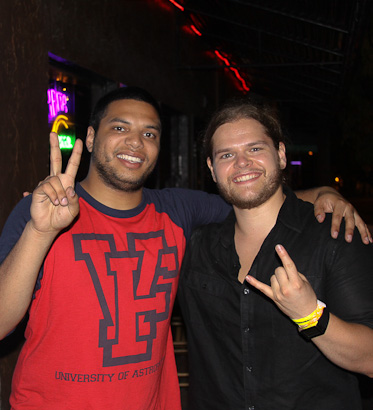
Misha Mansoor & Ivan Chopik
I was never crazy about Suhr Guitars… I was like “they’re expensive and they look beautiful,’ but I played Travis LeVrier’s [Scale The Summit] seven string that he got… it looks beautiful and I would have thought nothing of it. He sent me pictures of it and I was like ‘that’s a gorgeous guitar.’ I played it and immediately I was like ‘yes, this is awesome!’ and that to me is what’s more important than anything.
It’s spec’d out pretty differently from what I would get myself, but now it’s like, ‘oh man, I should try that,’ because I really liked that guitar… maybe that is part of what makes it…. That is definitely what I look for in a guitar and the brands that consistently put that out, those are the brands that I respect.
IC: You keep in touch with your fans, reading their questions and spending a lot of time getting them their answers. Is there anything that you’d like to share with them that maybe doesn’t come across in all those questions or at shows?
MM: I’m a sarcastic dude. You should probably never take anything I say too seriously. I see a lot of people getting offended at things that I say and I’m just like ‘Ok, I can see that,’ because it’s text and you really can’t convey emotion.
But I’m pretty sarcastic and I guess when I’m talking I hear it in my head and I’m like ‘that’s hilarious,’ but to someone else it probably doesn’t come off that way. Probably, you shouldn’t take anything I say too seriously for that reason, but I appreciate people who stay in touch. I like staying in touch with the fans… it’s something I’ve done since day one so at least for me, it doesn’t feel like a chore or anything like that. It’s just part of what I do.
IC: It’s probably what makes the whole experience a lot more personal.
MM: It’s a new way of doing things. I think a lot of older school bands don’t quite get that. For them it might be a chore, because they might be like ‘hey, I was doing things this way and it was totally fine and all of a sudden it’s not enough. What’s the deal?’ And that’s totally fair, it’s just the world changing under their feet but for me, that’s kind of how we came about, so that’s something that I enjoy.
[Special thanks to: Jeff Holcomb for his behind-the-scenes video footage, Adam Getgood for his outstanding photography, Joshua Weidling and DigitalTourBus.com for their detailed Periphery tour van footage, Lester Caballero for his in-depth transcription, Igor Stolarsky for his excellent audio editing.]



